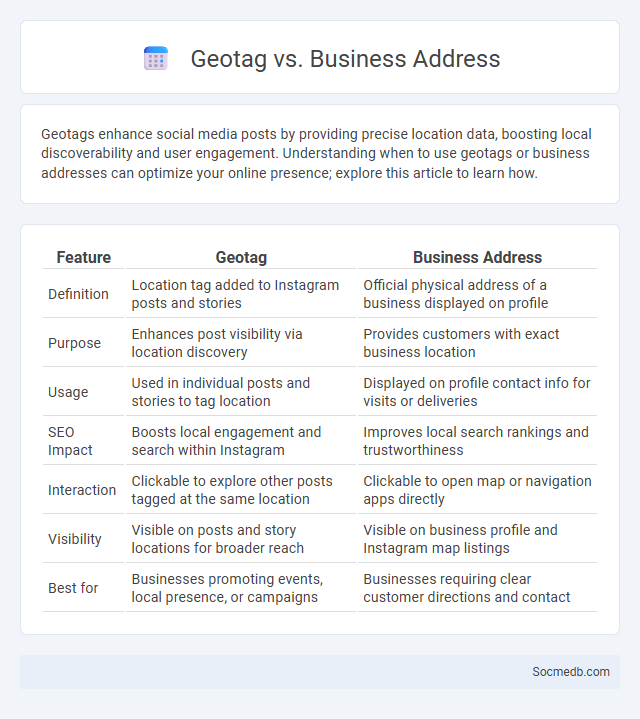
Photo illustration: Geotag vs Business Address
Geotags enhance social media posts by providing precise location data, boosting local discoverability and user engagement. Understanding when to use geotags or business addresses can optimize your online presence; explore this article to learn how.
Table of Comparison
| Feature | Geotag | Business Address |
|---|---|---|
| Definition | Location tag added to Instagram posts and stories | Official physical address of a business displayed on profile |
| Purpose | Enhances post visibility via location discovery | Provides customers with exact business location |
| Usage | Used in individual posts and stories to tag location | Displayed on profile contact info for visits or deliveries |
| SEO Impact | Boosts local engagement and search within Instagram | Improves local search rankings and trustworthiness |
| Interaction | Clickable to explore other posts tagged at the same location | Clickable to open map or navigation apps directly |
| Visibility | Visible on posts and story locations for broader reach | Visible on business profile and Instagram map listings |
| Best for | Businesses promoting events, local presence, or campaigns | Businesses requiring clear customer directions and contact |
Introduction to Geotag, Business Address, and Their Differences
Geotags are metadata tags that provide precise geographic information for social media posts, enabling users to associate content with specific locations. A business address serves as a static, physical location identifier used for establishing a company's presence on social platforms and in online directories. The key difference lies in geotags being dynamic, user-generated location markers for individual posts, while business addresses are fixed, official details representing a company's exact physical site.
What is Geotagging?
Geotagging embeds geographical coordinates into your social media posts, photos, and videos, enabling location-based searches and enhancing content relevance. By adding precise location data, platforms like Instagram and Facebook can categorize and recommend your content based on user location preferences. This feature helps increase visibility and engagement by connecting your posts to specific places or events.
Understanding Business Address in Digital Context
Understanding your business address in a digital context is essential for optimizing online visibility and customer trust. A consistent and accurate address across social media platforms enhances local SEO, helping potential clients find Your business easily. Integrating geolocation data with social profiles ensures coherent branding and improves search engine rankings.
Geotag vs. Business Address: Key Comparisons
Geotags provide precise geographic coordinates that enhance location-based content discovery on social media platforms, while business addresses offer standardized contact, navigation, and verification information essential for customer trust and local SEO. Geotags improve user engagement through real-time location context and visual mapping features, whereas business addresses support consistent listings across directories and facilitate accurate search engine indexing. Both elements are crucial for optimizing local reach but serve distinct purposes in digital marketing strategies.
How Geotagging Impacts Local SEO
Geotagging enhances local SEO by embedding precise geographic coordinates into social media posts, making content more discoverable to users searching for nearby businesses or services. Platforms like Instagram and Facebook use geotags to prioritize local relevance, increasing organic reach and engagement within target communities. Businesses that leverage consistent geotagging strategies gain improved visibility in local search results, driving higher foot traffic and localized customer interactions.
Business Address Verification: Why It Matters
Business address verification is crucial for maintaining data accuracy and enhancing customer trust on social media platforms. Accurate address information improves local search visibility and ensures seamless interactions in location-based marketing campaigns. Verifying business addresses reduces fraud risk and supports compliance with platform policies, fostering authentic brand presence online.
Geotagging in Social Media and Online Marketing
Geotagging in social media enhances online marketing by enabling brands to target audiences based on precise location data, increasing local engagement and relevance. Integrating geotags with social media campaigns boosts visibility in location-specific searches, driving foot traffic and improving customer acquisition for local businesses. Analyzing geotagged content provides marketers with actionable insights into consumer behavior and regional trends, optimizing ad spend and campaign effectiveness.
Pros and Cons: Geotag versus Business Address
Geotags enhance social media posts by providing precise location data that increases local engagement and discoverability, driving more foot traffic and online interactions for your business. However, relying solely on geotags may reduce clarity for customers unfamiliar with less obvious locations, while a business address offers clear, consistent contact information that builds trust and aids in navigation. Balancing geotags for real-time engagement with a clear, standardized business address ensures optimal visibility and customer accessibility on social media platforms.
Use Cases: When to Use Geotag or Business Address
Businesses should use geotags on social media posts to increase local visibility and attract nearby customers searching for relevant services or products. Including a business address in posts or profiles enhances trust and helps users find your physical location easily, boosting foot traffic and engagement. You optimize your social media strategy by targeting location-specific audiences and improving local SEO through consistent use of geotags and accurate business addresses.
Best Practices for Leveraging Geotags and Business Addresses
Incorporating precise geotags and accurate business addresses in social media posts significantly enhances local search visibility and boosts engagement rates by connecting with nearby audiences. Consistently updating location information on platforms like Instagram, Facebook, and Google My Business ensures maximum discoverability and builds trust with potential customers. Leveraging user-generated content tagged with your business location further amplifies social proof and drives organic reach.
 socmedb.com
socmedb.com